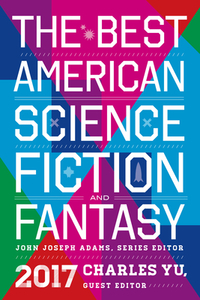You need to sign in or sign up before continuing.
Take a photo of a barcode or cover
Like most short story books this one was up and down - some great and intriguing some just meh. However, overall this was a fun read
adventurous
emotional
funny
hopeful
inspiring
reflective
fast-paced
Not as good as last year's, though that might just be because my literary tastes more closely align with Karen Joy Fowler than Charles Yu.
Delightful, wildly imaginative collection of stories that ranges from hopeful to cynical. I was only bored with one story (I Was a Teenage Werewolf), which leads me to believe the editor knew what he was doing when selecting these stories.
I loved one of the short stories in this collection and found the rest to be experimental, depressing, or just angry. I get including some stories like those, but to have the majority of the anthology to run that way just seemed like overkill. If this is truly what is popular or considered good in scifi and fantasy, then I need a new genre to read and write.
Head, Scales, Tongue, Tail - 4* - Great story about teenage romance. Falls off at the end.
Teenagers from Outer Space - 3* - Fine but nothing special. Well written but don’t totally understand the rapturous praise.
I’ve Come to Marry the Princess - 4* - Surreal and funny story about forgotten things. Little bit of a gut punch at the end.
Everyone From Themis Sends Letters Home - 5* - Brilliant. Brains in vats, epistolary format, prison industrial complex, corporate espionage, the works.
The Witch of Orion Waste and the Boy Knight - 4* - Very good in theory, not great in execution. I’ll split the difference and be generous because I really do like the idea of a story about how women always do too much and too little told through the lens of a witch and knight.
When They Came to Us - 4* - A little didactic for me, but the style and emotional impact still work well.
Vulcanization - n/a - I feel like I’m missing something from not having read Everfair. This is grotesque in a way that I find rewarding, but I don’t really understand a lot of it.
Openness - 5* - Beautiful, simple, extraordinarily painful.
Not by Wardrobe, Tornado, or Looking Glass - 2* - Entertaining enough but the ending is weak. Very “reading is magic!” which I don’t find compelling.
The Future is Blue - 4* - A nice light(ish) twist on the post-deluge story that turns very dark at the end.
This is Not a Wardrobe Door - 2* - Cute but very not for me.
On the Fringes of the Fractal - 3* - Interesting enough. Great last line.
The Story of Kao Yu - 3* - Beagle has a knack for writing deeply sad and melancholy stories (Last Unicorn is such a perfect book). I’m not sure I was satisfied with the end of this one, though.
Smear - 5* - Short, weird, unsettling. Makes me want to read more of Evenson’s work.
The City Born Great - 3* - An interesting attempt to take back Lovecraft from the darker elements of Lovecraft’s personality. Better in theory than execution.
Welcome to the Medical Clinic… - 4* - This is close to great. I’m grading on a curve because the idea of a choose your own adventure story that always go to the same place because trying to receive medical care is a Kafka-esque nightmare is fantastically smart and funny. The major problem is that the story keeps telling you explicitly that that’s what it’s doing, which makes it feel much less clever than it should.
Successor, Usurper, Replacement - 5* - Scary and fun. A story of doppelgängers and impostors and fame.
Caspar D. Luckinbill, What Are You Going to Do? - 5* - So dark and vicious and cynical. Completely off kilter, almost Vonnegut-esque, with a total gut-punch of an ending.
I Was a Teenage Werewolf - 4* - Cute (if you can call it that) story about being a teenager, that wildest and most untamed of creatures.
The Venus Effect - 4* - Just awful and brutal and gut-wrenching all the way through. A little glib and goofy, which is why it’s not 5*, but this is pretty solid.
Teenagers from Outer Space - 3* - Fine but nothing special. Well written but don’t totally understand the rapturous praise.
I’ve Come to Marry the Princess - 4* - Surreal and funny story about forgotten things. Little bit of a gut punch at the end.
Everyone From Themis Sends Letters Home - 5* - Brilliant. Brains in vats, epistolary format, prison industrial complex, corporate espionage, the works.
The Witch of Orion Waste and the Boy Knight - 4* - Very good in theory, not great in execution. I’ll split the difference and be generous because I really do like the idea of a story about how women always do too much and too little told through the lens of a witch and knight.
When They Came to Us - 4* - A little didactic for me, but the style and emotional impact still work well.
Vulcanization - n/a - I feel like I’m missing something from not having read Everfair. This is grotesque in a way that I find rewarding, but I don’t really understand a lot of it.
Openness - 5* - Beautiful, simple, extraordinarily painful.
Not by Wardrobe, Tornado, or Looking Glass - 2* - Entertaining enough but the ending is weak. Very “reading is magic!” which I don’t find compelling.
The Future is Blue - 4* - A nice light(ish) twist on the post-deluge story that turns very dark at the end.
This is Not a Wardrobe Door - 2* - Cute but very not for me.
On the Fringes of the Fractal - 3* - Interesting enough. Great last line.
The Story of Kao Yu - 3* - Beagle has a knack for writing deeply sad and melancholy stories (Last Unicorn is such a perfect book). I’m not sure I was satisfied with the end of this one, though.
Smear - 5* - Short, weird, unsettling. Makes me want to read more of Evenson’s work.
The City Born Great - 3* - An interesting attempt to take back Lovecraft from the darker elements of Lovecraft’s personality. Better in theory than execution.
Welcome to the Medical Clinic… - 4* - This is close to great. I’m grading on a curve because the idea of a choose your own adventure story that always go to the same place because trying to receive medical care is a Kafka-esque nightmare is fantastically smart and funny. The major problem is that the story keeps telling you explicitly that that’s what it’s doing, which makes it feel much less clever than it should.
Successor, Usurper, Replacement - 5* - Scary and fun. A story of doppelgängers and impostors and fame.
Caspar D. Luckinbill, What Are You Going to Do? - 5* - So dark and vicious and cynical. Completely off kilter, almost Vonnegut-esque, with a total gut-punch of an ending.
I Was a Teenage Werewolf - 4* - Cute (if you can call it that) story about being a teenager, that wildest and most untamed of creatures.
The Venus Effect - 4* - Just awful and brutal and gut-wrenching all the way through. A little glib and goofy, which is why it’s not 5*, but this is pretty solid.
3.5 stars
I've become a fan of this anthology series over the past few years. Sci-fi/fantasy isn't an area I spend a lot f reading time in, but I like to touch base once a year. Each installment has a new guest editor, which makes for a different definition of "best" every year.
I'm only familiar with this year's editor, Charles Yu, by name. I haven't read any of his work. But judging by his taste in stories, I might have to check out his books. He's got a good eye.
Themes I saw coming up often in this volume: teen nostalgia, fear of new arrivals, portal fiction gone wrong, global warming and its aftermath, stories with a foot in the real world.
Highlights:
"Teenagers From Outer Space" and "I Was a Teenage Werewolf" by Dale Bailey
"Everyone From Themis Sends Letters Home" by Genevieve Valentine
"The Witch of Orion Waste and the Boy Knight" by E. Lily Yu
"Vulcanization" by Nisi Shawl- Looking Glass" by Jeremiah Tolbert-
"The Future is Blue" by Catherynne M. Valente-
"Successor, Usurper, Replacement" by Alice Sola Kim
I don't typically read short story anthologies, but the colourful cover of this intrigued me and I had a hankering to try out some new authors. I noticed this collection had a few authors I've read and enjoyed before (Catherynne M. Valente, Leigh Bardugo, N.K. Jemisin, etc.) as well, so I figured there were enough stories I was very likely to enjoy alongside the new-to-me authors.
First off, I want to applaud this collection for its diversity. Not only are there a number of women, people of colour and queer authors in this collection, but there's also a diversity in the stories being told. A lot of them aren't cut-and-dry sci-fi or fantasy - some of them toe the line or play with the genres in interesting ways. The stories that demonstrated this most noticeably for me were: Bardugo's, Tolbert's, Yoachim's and Hill's. Some of the stories were topical (ie. dealing with police brutality) while others played with the format (there's a choose-your-own-adventure story! ...kind of), but all of them brought something new and fun to the table.
I would recommend this collection whether you're new to SFF - this a good introduction to some big names in the genre - or are a hardcore fan looking for something that pushes the envelope a bit.
First off, I want to applaud this collection for its diversity. Not only are there a number of women, people of colour and queer authors in this collection, but there's also a diversity in the stories being told. A lot of them aren't cut-and-dry sci-fi or fantasy - some of them toe the line or play with the genres in interesting ways. The stories that demonstrated this most noticeably for me were: Bardugo's, Tolbert's, Yoachim's and Hill's. Some of the stories were topical (ie. dealing with police brutality) while others played with the format (there's a choose-your-own-adventure story! ...kind of), but all of them brought something new and fun to the table.
I would recommend this collection whether you're new to SFF - this a good introduction to some big names in the genre - or are a hardcore fan looking for something that pushes the envelope a bit.
Highlights:
"The Venus Effect," Joseph Allen Hill
"Welcome to the Medical Clinic at the Interplanetary Relay Station | Hours Since the Last Patient Death: 0," Caroline M. Yoachim
"On the Fringes of the Fractal," Greg van Eekhout
"Caspar D. Luckinbill, What Are You Going to Do?," Nick Wolven
"I Was a Teenage Werewolf," Dale Bailey
"The Venus Effect," Joseph Allen Hill
"Welcome to the Medical Clinic at the Interplanetary Relay Station | Hours Since the Last Patient Death: 0," Caroline M. Yoachim
"On the Fringes of the Fractal," Greg van Eekhout
"Caspar D. Luckinbill, What Are You Going to Do?," Nick Wolven
"I Was a Teenage Werewolf," Dale Bailey




